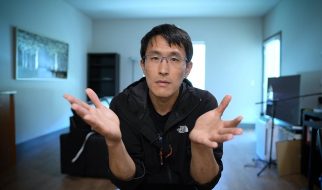
Recently, my life long best friend and business partner, Link Neal, and I made the decision to share publicly the stories of our journeys away from Evangelical Christianity. This wasn?t a decision either of us took lightly. We knew well the perils of wading into the polarizing waters of openly discussing faith. But, our podcast has grown more personal over the years as we have attempted to be honest and vulnerable in discussing how we?ve each dealt with the struggles of parenthood, the death of loved ones, and the harrowing adventure that is self-discovery. Given the fact that our Christian faith has played such an integral role not only in who we are today but also in what we do for a living, it was becoming somewhat unbearable (not to mention disingenuous) to keep it to ourselves.
Despite publishing thousands of pieces of content on the Internet over the years, we could only speculate as to how people would react. Now, weeks later, our stories have circulated well beyond our podcast listeners to many who have never heard an episode or watched one of our highly sophisticated YouTube videos in which we do things like attempt to consume bovine bile cheesecake only to spit it into custom made barf buckets.
Perhaps the most surprising aspect of these past weeks has been just how much time and emotional energy we and our wives have devoted to processing the response. This time has been heavy for the four of us. Together, we have digested a host of passionate reactions including unwavering encouragement, thoughtful rebuttals, and personal attacks. Honestly, we?ve struggled with knowing how to respond. All of this could easily devolve into what so much of public discourse in our country has become: a fruitless back and forth characterized by all sides hunkering further down in their trenches with no intention of truly listening.
And so, we?ve decided to move forward in the same manner that got us to this point: with honesty and vulnerability. It?s our intention to be open about how we are processing, even if we have little idea where it will lead.
This is my attempt to do just that.
An overwhelming number of the responses to our stories come from those with similar experiences, whether they are struggling with doubting a long-held faith or have been through their own process of deconstruction. These stories have lodged themselves in my heart. I understand the anguish, sleepless nights, and countless tears that come with abandoning your orienting principle of life. It?s the most painful thing I?ve ever done. Still, I have been endlessly encouraged by the hope so many have found after picking up the pieces of a shattered faith and rebuilding a life grounded in love, service, and humility.
Many Christians have offered gracious responses as well. I have received a multitude of messages, both public and private, that are saturated in Christ-like love and understanding. Some of these believers have confessed that they have found themselves gripped with the same sorts of doubts that eventually led to the unraveling of my faith, but many of them emerged on the other side of doubt with a deeper, more weatherproof belief system. While we may differ in our current conclusions, that recognition of our shared humanity has served my soul well. This extension of grace has made me yearn for the kind of community that Christians have done so well over the centuries, the love that has compelled many to cross the threshold of a church.
Yet, there are those Christians who have penned articles, posts, and comments that are dismissive, dehumanizing, and presumptuous.
Even though my story was intended to be a personal account of my process rather than a persuasive case against faith, I understand how it can be perceived as a calculated attack on traditional Christian belief. I knew many would passionately disagree with my conclusions, find fault in my process, and respond with detailed refutations, as is their right (if not obligation).
And to be clear, being disagreed with doesn?t (or shouldn?t) hurt.
However, being misrepresented and having your motives not only questioned but confidently assumed, does. Link and I have been accused of walking away from the faith in pursuit of cultural acceptance, never truly grasping the undeserved grace of God through Christ?s sacrifice, and never having had a sincere interest in seeking the truth. We?ve been reduced to convenient illustrations that can be nicely folded into twenty minute sermons, held up as examples of exactly what can go wrong with your children if they aren?t properly grounded in the faith, and cast as two more sad cases who followed the tired Hollywood script of putting fame and fortune before the pursuit of God.
In most of these posts, our faith transition has been characterized as an absolute disaster for the many kids who look up to us. It?s been said that we?ve squandered our responsibility and led thousands astray. Candidly, this has probably been the most difficult criticism to take. Between our two families, we have five children ranging in age from ten to sixteen. We and our wives have worked hard to help root our kids in love and curiosity as they navigate a challenging and often chaotic world, and we try to embody those same values in our videos.
Regrettably, many of these same articles and posts have been enthusiastically shared throughout the Evangelical community, being lauded as insightful, helpful takes.
I understand that neatly condensing me and Link down to theological footnotes is the easiest way to deal with us. If we simply fell victim to the seductive ways of the world and our doubts were based on misunderstandings and false information, then the youth group faith-grounding curriculum pretty much writes itself. But if you take our stories at face value or recognize the sincere nature of our journeys, things get complicated and cumbersome. We become significantly more inconvenient if we went from having a rich and personal faith, and then, after a long and painful grappling with legitimate questions, made the excruciating decision to depart.
I must say, though, that I?m empathetic to this way of thinking about our stories. I?m reminded of how Link and I exhibited this same sort of reaction toward a close friend who was deconstructing many years ago. And while I regret my actions and words, I honestly don?t know if I was capable of any other response at the time. For that reason, I am quick to forgive those who have disparaged us.
But, more significantly, I?ve been thinking about those who have left the church before me. While I was a part of the fold, I never experienced any misrepresentation or dehumanization of any kind. Quite the contrary. For me, the more I asserted myself, the more I was rewarded and promoted within the Evangelical system. It was only after I publicly announced my departure that I got a small taste of what it might be like for those marginalized by the church.
During my years as a Christian, as I stood idly by and benefited from the church, there were many who were being overlooked. There were women who wished to preach but knew they would be told they weren?t qualified to teach men if they indicated that desire. There were biracial believers looking to join a fellowship in their town only to realize they had to choose between a black church and a white church. There were undocumented Christian families who worshipped alongside those who fervently supported political candidates whose policies would increase their chances of being arrested and deported. There were gay couples who longed to marry but knew their church would turn them away.
I regret that I too had to become an inconvenience to the church to more fully appreciate the plight of the forgotten and the rejected. My heart breaks for all those who have walked into a church in search of Jesus only to find that he was politely escorted out years ago.
Despite the heartache that processing the harsher reactions to our stories has brought, I have hope. Hope that we can recognize our common humanity regardless of our beliefs. Hope that the church will grow in its compassion for those who are questioning the very foundations of their faith. Hope that those who make the agonizing decision to leave will know that there are more and more like them, former believers who want to be like Jesus even if they can no longer recite the creeds with conviction.
Thank you to everyone who has taken the time to listen to our stories. And despite the difficulty that sharing them has brought to us and our families, I trust that moving forward in authenticity will bring about the most good.
Let?s keep leaning into the mystery.


